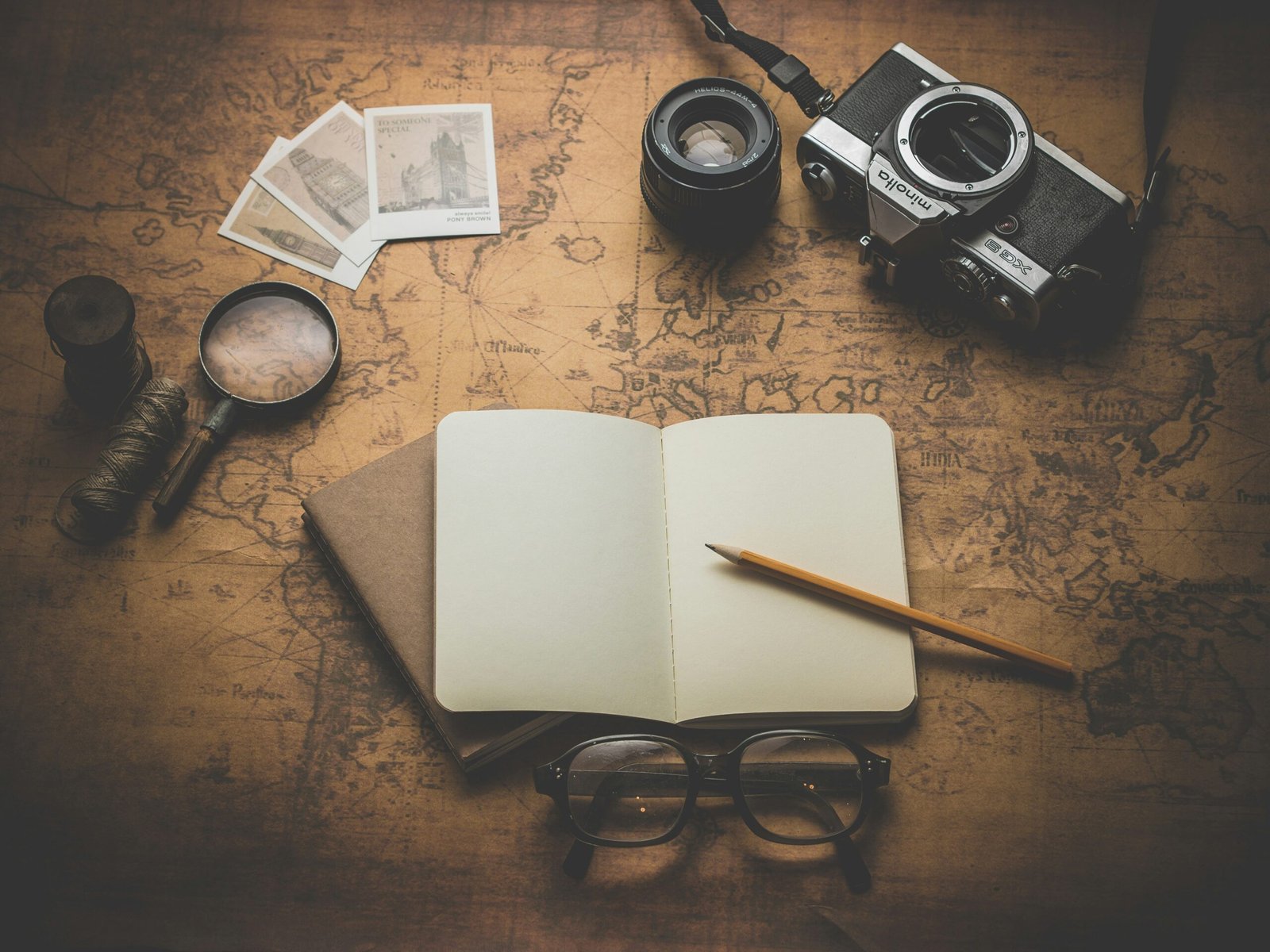Introduction: The Allure of the Well-Traveled Individual
In today’s interconnected world, the allure of the well-traveled individual has become increasingly prominent. Society often views those who explore different cultures and destinations as more attractive, attributing a sense of sophistication, open-mindedness, and worldly knowledge to such individuals. The perception that travel enriches a person’s character and broadens their perspective is widely held, making the act of journeying across the globe a desirable trait.
Traveling introduces one to a variety of experiences, from navigating bustling cityscapes to immersing in remote natural landscapes. These experiences cultivate a sense of adaptability and resilience, qualities that are inherently attractive. The exposure to diverse cultures and ways of life fosters empathy and a deeper understanding of the human experience, further enhancing a person’s appeal. This broadened worldview is not just a superficial trait but a profound transformation that influences how a person interacts with the world around them.
Moreover, the stories and memories accumulated from travels serve as a rich tapestry of conversation pieces, making well-traveled individuals more engaging and intriguing. The ability to share unique experiences and insights gained from different corners of the globe adds depth to their personality, making them stand out in social settings. It is this combination of enhanced social skills, cultural awareness, and personal growth that underpins the increased attractiveness of those who travel.
The subsequent sections of this blog will delve deeper into the various facets of how traveling contributes to a person’s attractiveness. From boosting confidence to enhancing communication skills, we will explore the myriad ways in which the act of traveling shapes and refines an individual, ultimately making them more appealing in the eyes of others.
Traveling frequently necessitates leaving the familiar behind, propelling individuals into uncharted territories where they must rely on their wits and adaptability. This journey often begins with navigating foreign cities, an experience that can be daunting yet immensely rewarding. When faced with the challenge of finding their way in a new environment, travelers develop a heightened sense of direction and problem-solving skills. This newfound ability to manage unfamiliar situations effortlessly contributes to a significant boost in self-assuredness.
Overcoming language barriers is another crucial aspect of travel that fosters confidence. Whether it’s mastering a few essential phrases in the local language or communicating through gestures and expressions, the act of effectively conveying one’s needs in an unfamiliar tongue is empowering. Each successful interaction, no matter how minor, reinforces a traveler’s belief in their capacity to overcome obstacles. This sense of triumph and self-reliance naturally enhances one’s self-esteem and overall poise.
Furthermore, traveling often involves making spontaneous decisions, from choosing impromptu activities to altering travel plans on the fly. These moments of spontaneity require quick thinking and decisiveness, qualities that are integral to self-confidence. The ability to make informed choices under pressure and adapt to changing circumstances strengthens a traveler’s trust in their judgment. This growing sense of decisiveness not only aids in navigating the complexities of travel but also translates into everyday life, making the individual appear more confident and self-assured.
The correlation between increased confidence and attractiveness is well-documented. Confidence exudes a magnetic charm that draws people in, making individuals appear more appealing and approachable. As travelers conquer the myriad challenges of exploring new destinations, their self-assuredness naturally radiates outward, enhancing their overall attractiveness. Thus, the very act of traveling, with all its inherent demands and rewards, plays a pivotal role in elevating one’s confidence, subsequently making them more attractive to others.
Cultural Awareness: The Appeal of Being Open-Minded
Traveling is often lauded for its ability to expose individuals to a myriad of cultures, traditions, and ways of thinking. This immersion into diverse environments fosters a sense of cultural awareness that is both enriching and transformative. When individuals journey beyond their familiar surroundings, they encounter new customs, languages, and social norms that challenge their preconceived notions. This exposure not only broadens their perspective but also cultivates a heightened sense of empathy and understanding.
Open-mindedness, as nurtured through travel, is a quality that significantly enhances one’s attractiveness. People who are culturally aware are often perceived as more adaptable, tolerant, and approachable. They possess a unique ability to relate to others, irrespective of their background, which can make them particularly appealing in social and professional settings. This capacity to connect on a deeper level stems from the understanding that differences are not only to be respected but celebrated.
Moreover, the sensitivity developed through travel extends beyond mere tolerance; it involves an active appreciation and curiosity for other cultures. This genuine interest in learning about and from others can be a magnetic trait. It signals a person’s willingness to step out of their comfort zone and embrace the unknown, which is inherently attractive. Such individuals are often seen as more dynamic and interesting, possessing a wealth of experiences and stories that enrich their interactions with others.
Being culturally aware also equips individuals with better communication skills. They become more adept at navigating conversations with diverse groups, understanding nuances, and avoiding cultural missteps. This skill set is invaluable in our increasingly globalized world, where intercultural communication is pivotal. People who can effortlessly bridge cultural gaps are not only attractive but are also often more successful in both personal and professional endeavors.
Ultimately, the appeal of being open-minded lies in the ability to empathize and engage with others on a meaningful level. Travel, by fostering cultural awareness, significantly enhances this trait, making individuals more attractive through their broadened perspectives and enriched interpersonal skills.
Storytelling: The Charm of Having Unique Experiences
Traveling often provides individuals with a wealth of unique experiences, which in turn become captivating stories to share with others. These narratives not only serve as icebreakers in social settings but also enhance one’s ability to engage listeners, making conversations more dynamic and intriguing. When people recount their travel adventures, they offer glimpses into different cultures, landscapes, and challenges they have encountered. This storytelling ability sets them apart as fascinating conversationalists, drawing others in and fostering deeper connections.
Moreover, sharing travel stories can enhance one’s social appeal. These anecdotes demonstrate a person’s curiosity, open-mindedness, and willingness to step out of their comfort zones—qualities that are universally attractive. Whether it’s recounting a spontaneous hiking trip in the Alps or navigating the bustling streets of Tokyo, these stories reflect a sense of adventure and adaptability. Such traits not only make individuals more interesting but also more relatable, as listeners may find common ground or feel inspired by these experiences.
Travel stories also offer the opportunity to showcase personal growth and resilience. Overcoming language barriers, handling unforeseen travel mishaps, or immersing oneself in unfamiliar customs, all contribute to a richer, more layered personality. By sharing these experiences, travelers can subtly convey their problem-solving skills, cultural awareness, and emotional intelligence—attributes that are highly valued in both personal and professional relationships.
Finally, the ability to narrate travel experiences effectively can significantly enhance one’s social interactions. Engaging storytelling requires attention to detail, an understanding of the audience, and the ability to convey emotions and experiences vividly. These skills not only make the storyteller more compelling but also foster empathy and interest among listeners. Thus, the charm of having unique travel experiences lies not just in the adventures themselves but in the powerful stories they generate, making individuals more attractive and engaging in the eyes of others.
Independence and Resourcefulness: The Magnetism of Self-Sufficiency
Traveling often necessitates a significant level of independence and resourcefulness, qualities that undeniably enhance one’s attractiveness. When individuals embark on journeys, especially solo travel experiences, they are compelled to rely on their own capabilities and judgment. This self-sufficiency is not just about survival; it is about thriving in unfamiliar environments and making the most of new opportunities.
One vivid example is solo travel, which pushes individuals out of their comfort zones and into situations where they must make decisions independently. Navigating through foreign cities, managing unexpected travel changes, and communicating in different languages are all scenarios that demand a traveler’s resourcefulness. These experiences cultivate a strong sense of confidence and competence, traits that are universally appealing.
Moreover, problem-solving becomes an everyday necessity while traveling. Whether it’s figuring out public transportation in a new country or finding a place to stay at the last minute, these challenges require quick thinking and adaptability. The ability to handle such situations gracefully showcases a person’s ingenuity and resilience. These qualities are not only essential for overcoming travel-related obstacles but also translate into everyday life, making a person appear more capable and reliable.
Furthermore, thriving without a traditional support system highlights a traveler’s autonomy. Being away from the familiar comforts of home and loved ones means that travelers must develop their own strategies to cope with loneliness and adversity. This self-reliance can be incredibly attractive as it shows a person’s strength and ability to maintain composure under pressure.
In essence, the independence and resourcefulness honed through travel create a magnetism that is hard to ignore. These traits not only enhance a person’s ability to navigate the world but also make them more appealing to others by demonstrating their competence, resilience, and self-sufficiency.
Physical Fitness: The Side Effect of an Active Lifestyle
Traveling often entails a range of physical activities that not only enrich the experience but also contribute significantly to physical fitness. Engaging in hiking, walking through unfamiliar cities, and exploring natural landscapes are common components of travel itineraries that inherently demand physical exertion. This active lifestyle, which frequently accompanies travel, can lead to improved cardiovascular health, increased muscle tone, and better overall physical conditioning.
The link between physical activity and attractiveness is well-documented. Regular physical exercise helps in maintaining a healthy weight, enhancing muscle definition, and boosting energy levels. These factors collectively contribute to a more appealing physical appearance. When traveling, individuals often find themselves more motivated to stay active, whether it’s through hiking up a mountain to catch a breathtaking view, strolling through a bustling market, or swimming in exotic waters. Such activities not only provide an immediate sense of accomplishment and joy but also promote long-term physical health.
Staying active while traveling also has the added benefit of reducing stress levels, improving mood, and enhancing mental clarity. The release of endorphins during physical activity can lead to a natural glow and a more vibrant appearance, attributes commonly associated with attractiveness. Moreover, the diverse physical activities encountered during travel help in targeting different muscle groups, leading to a more balanced and well-rounded physical fitness.
Incorporating physical activities into travel plans does not necessitate extensive planning or equipment. Simple activities such as walking or cycling can be seamlessly integrated into daily itineraries, allowing travelers to explore their destinations more intimately while reaping the benefits of exercise. Thus, an active travel lifestyle not only enriches the travel experience but also fosters a healthier, more attractive physical presence.
Global Networking: The Advantage of a Diverse Social Circle
Traveling offers a unique opportunity to meet individuals from a multitude of cultural backgrounds, thereby significantly expanding one’s social network. This diverse social circle not only enriches personal experiences but also enhances one’s attractiveness in several ways. When you interact with people from different parts of the world, you develop a broad understanding of various cultures, traditions, and perspectives. Such exposure fosters open-mindedness and adaptability, traits that are highly valued in social and professional settings.
Having a global network also demonstrates advanced social skills. The ability to connect with a wide range of people suggests strong communication skills, empathy, and a genuine interest in others. These qualities are universally appealing and can make an individual more attractive to potential friends, partners, and employers. Moreover, navigating different social norms and customs requires a level of cultural intelligence that reflects positively on one’s character.
Furthermore, a diverse social circle can lead to numerous opportunities for personal and professional growth. Whether it’s through collaborative projects, job offers, or simply learning from others’ experiences, the benefits of a global network are manifold. It shows that you are resourceful and capable of building meaningful relationships beyond your immediate environment. Such a trait is often seen as a mark of success and ambition, further adding to your attractiveness.
In addition, engaging with people from different cultures can help dispel stereotypes and promote a more inclusive worldview. This not only broadens your horizons but also makes you more relatable and approachable. People are naturally drawn to those who exhibit a sense of inclusivity and understanding, making you a more desirable companion in both social and professional circles.
Therefore, the advantages of a diverse social network extend far beyond mere social connections. They contribute to personal development and significantly enhance one’s attractiveness by showcasing a well-rounded, open-minded, and socially adept individual.
Conclusion: The Holistic Appeal of the Well-Traveled Individual
In conclusion, the multifaceted benefits of travel contribute significantly to an individual’s attractiveness. The experiences and challenges encountered during travel cultivate a unique blend of confidence and resilience. This heightened self-assurance is not only appealing but also infectious, often inspiring admiration and respect from others.
Moreover, cultural awareness gained through travel fosters a deeper understanding and appreciation of diverse perspectives. This cultural sensitivity enhances an individual’s ability to connect with others on a more profound level, making them more empathetic and approachable. The stories and experiences accumulated while traveling also augment one’s storytelling abilities, providing a treasure trove of anecdotes that can captivate and engage any audience.
Independence, another byproduct of extensive travel, further adds to one’s attractiveness. Navigating unfamiliar territories and situations independently demonstrates a high degree of self-reliance and problem-solving skills. These traits are highly valued and often perceived as markers of a capable and competent individual.
Physical fitness, often a natural outcome of an active travel lifestyle, also plays a crucial role. Whether it’s hiking, exploring new cities on foot, or participating in adventure sports, the physical activities associated with travel contribute to a healthier and more vibrant appearance.
Lastly, the social skills honed through constant interaction with new people and environments enhance one’s ability to communicate and connect effectively. These refined social abilities are essential in building and maintaining meaningful relationships, further amplifying an individual’s overall attractiveness.
Travel enriches a person in ways that are both tangible and intangible. The cumulative effect of these attributes—confidence, cultural awareness, storytelling prowess, independence, physical fitness, and social skills—creates a holistic appeal that is undeniably attractive. Thus, the well-traveled individual stands out not only for their worldly experiences but also for the profound personal growth they embody.
FAQs: Common Questions About Travel and Attractiveness
Do you have to travel extensively to gain these benefits?
Not necessarily. While extensive travel can offer profound experiences and insights, even short trips can contribute significantly to personal growth and attractiveness. The key is to immerse yourself in new environments, cultures, and experiences, which can happen on both long and short journeys. The benefits derived from travel are more about the quality of the experience rather than the duration.
Can short trips also make a difference?
Absolutely. Short trips can be just as impactful as longer ones. Weekend getaways or short excursions can provide a refreshing change of scenery, helping to alleviate stress and enhance your overall well-being. These trips can also offer opportunities for learning and personal development, which contribute to making you more attractive. Short trips allow you to explore new places without the need for extensive planning or time commitment.
How can someone who hasn’t traveled much start?
Starting small is a practical approach. Begin by exploring nearby towns or cities. Day trips or weekend getaways can be a great way to ease into the habit of traveling. Gradually, you can expand your horizons by planning longer trips to more distant locations. Joining travel groups or forums can also provide valuable tips and support. Additionally, reading travel blogs and guides can help you plan and prepare for your journeys.
Are there any downsides to traveling often?
While traveling offers numerous benefits, there are potential downsides to consider. Frequent travel can be physically and mentally exhausting, leading to travel fatigue. It can also be financially demanding. Moreover, constant travel may impact relationships and responsibilities at home. To mitigate these downsides, it’s important to plan trips mindfully, ensure adequate rest, and maintain a balanced approach to travel and everyday life.



